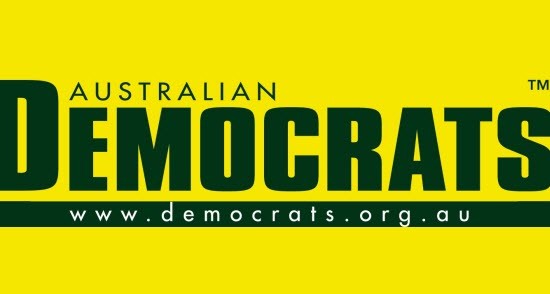
The Australian Democrats — which narrowly survived an attempt to shut them down earlier this year — appear to be on the brink of oblivion once more.
The party has no national president, is paralysed by a nasty internal split, and has not commenced preselections for the federal election. It has dwindling membership, less money, no MPs, and is fielding what critics say may be a fake candidate in tomorrow’s ACT election.
“It could be over,” one party member told Crikey.
It’s not a noble end for the trailblazing party, which held the balance of power in the Senate several times, promoted female politicians before it was fashionable and won seats in most state parliaments.
The AEC attempted to deregister the Democrats earlier this year for not having 500 members (the minimum required to register as a party); the AEC initially rejected the party’s membership list, but relented when fresh material was supplied. Hopes for the party flared briefly when former senator Brian Greig became national president in July, but he resigned in disgust at the party’s factionalism less than a month later.
More than two months later, the party has no national president and apparently no one acting in the role; there is no date set to vote in a president.
The party has been riven by a power struggle between forces sympathetic to Greig, and those in what critics call “the Sandra camp” — the faction of former South Australian MP Sandra Kanck.
Darren Churchill returned Crikey‘s call to Democrats’ national HQ, saying he was the senior deputy national president and claiming to be the “place holder” for the president. Churchill (who is allied to Kanck) said he had nominated to be president. According to this Democrats’ media release, Churchill is running in Saturday’s ACT election as a Democrats candidate. He’s listed as “ungrouped” on the ballot paper.
However, the party’s SA president, Michael Pilling, told Crikey: “Darren is currently a suspended member of the Democrats, he should not be doing anything publicly in the name of the Democrats.” It is understood there is an internal investigation into Churchill and who did what to the disputed membership lists earlier this year (the two factions appear to have submitted separate lists to the AEC). Pilling said Churchill was not eligible to nominate for national president.
Churchill told Crikey: “Michael Pilling has declared himself emperor … I’m a Democrats-endorsed candidate.” He says those who had voted to suspend his membership don’t have the constitutional provision to do so, therefore he is not suspended. His ACT election posters feature the Democrats’ logo.
Undeterred by attacks on his party membership, Churchill, who says he is a teacher and occasional fitness instructor, told Crikey that if he became the Democrats’ national president he had “plans to reinvigorate the party” and win back seats in parliaments.
Crikey asked Churchill if the Democrats’ famous pledge to “keep the bastards honest” still rang true, given the party’s troubles. “Of course it still fits,” he said. “The whole thing about keeping the bastards honest is that our MPs are expected to vote with their conscience at all times.” When Crikey pointed out the party did not actually have any MPs, he replied: “When we get in, we will.”
The “Sandra camp” has sent out this document to some members:
Crikey contacted Greig for comment on the challenges confronting the Democrats; he referred inquiries to Pilling. Crikey understands Greig’s resignation letter said he had had enough of the internal wreckers and was shocked by the behaviour of some members who did not like the election result which saw him become president.
Democrats members gave differing reports of how many members the party has; Crikey estimates it at 350-500. (The party will not have to prove it has 500 members to the AEC for another two-and-a-half years.)
While some party members contacted by Crikey had given up on the ailing party, one was optimistic. “I think the Democrats will be turned around [but] the status quo has to change,” they said, arguing there was space on the political spectrum for a party that was socially liberal but relatively conservative on economic matters.
The Democrats were founded in 1977 by Don Chipp. The party’s decision to pass the Howard government’s GST in 1999, under leader Meg Lees, was controversial. The party lost its last Senate seat in 2008 (as a result of the 2007 election) and lost its last state seat several years ago.









How long before the same is written about The Greens? The replacement of the charismatic founder and leader Bob Brown with the Christine Milne will see the start of serious decline. The Democrats managed some capable, and a few quirky, female leaders before ripping themselves apart over policy. The Greens already have difficulty keeping their policy differences inside the tent. As their vote declines the argument over whether to swing left or right to gain support will be ugly.
What a lot of Hogswash!
People have been saying every time the Australian Democrats run a candidate in an election it is their last chance – but they seem to continue running candidates.
And as for no Federal candidates endorsed, I believe their is a gentleman in QLD by the name of Dr. Paul Stevenson who has been endorsed.
It doesn’t surprise me this Churchill bloke is being dumped, have you seen the Media Releases he has put out of the past 12 months – absolutely ridiculous. Not one of them have had any relevance to the issues of the day.
I am an Australian Democrats fan from a far and always vote for them and I say move this Churchill person on and let a new and enthusiastic breed come through.
It is a shame you write a piece like this in today’s political climate when really the voting public need to be reminded there are other options out there.
The idea that any individual or group of politicians will return to keeping the bastards honest, has like the old style backbone owning politicians, begun to disappear into a black hole of voter apathy. Edward James
I don’t think the Democrats will be missed. The Greens have risen to assume the balance of power role in the Senate and also have seats in most state parliaments. There are also other parties like the Sex Party and Liberal Democratic Party which will have absorbed many former Democrats.
Few seem to recall Don Chipp was a hawk in Fraser’s Cabinet and his miraculous conversion to opposing the Viet Nam War began only AFTER he left that Cabinet. So that was keeping the bastards honest? True the Democrats “decision to pass the Howard government’s GST in 1999, under leader Meg Lees, was controversial.” I recall a poll of rank and file Democrats at that time supporting the GST, and most economists (not to mention Paul Keating et al) believed it was in Australia’s best interests to introduce it) so the Democrats learnt the dangers of being too honest when the bastards are after you — especially if it’s articulate ambitious careerists in your own Party?
Perhaps that was when they realised the dangers of too much honesty?
Beachcomber is correct in asking, “How long before the same is written about The Greens?” Bob Brown’s charisma certainly enabled him to get away with condemning President Bush Senior for not finishing off Iraq’s Hussein in Gulf War I, followed by condemning President Bush Junior for finishing off Hussein in Gulf War II.
Only Bob Brown had the agility to advocate dirty brown coal power generation when it suited his political goals but reverse (and ‘forget’) that stand when he belatedly realised that now he was in Canberra, “greenhouse gas” had such effective voter cachet.
Sadly Milne lacks the gift Cheryl Keane showed when she attacked Labor so vigorously in a South Australian State Election campaign at the very time she was negotiating behind very closed doors with a close friend to be given a safe Labor seat in Federal Parliament.